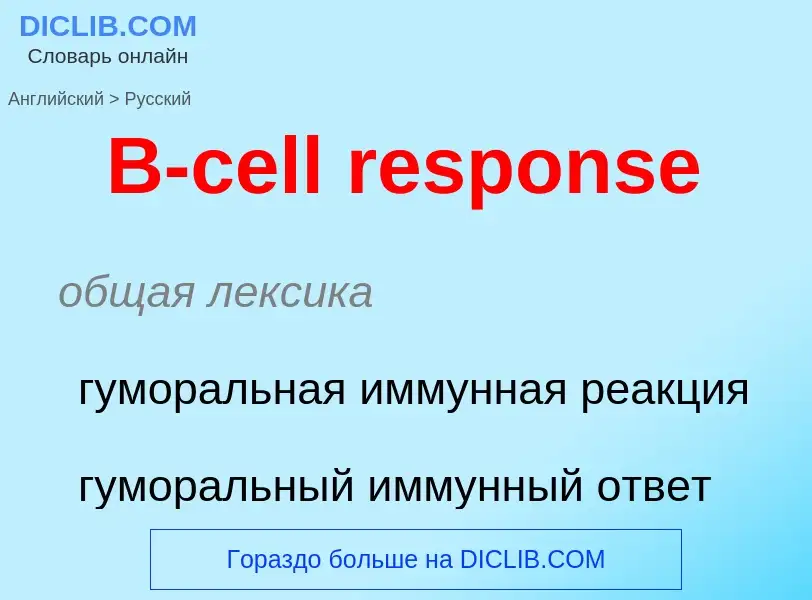Traducción y análisis de palabras por inteligencia artificial ChatGPT
En esta página puede obtener un análisis detallado de una palabra o frase, producido utilizando la mejor tecnología de inteligencia artificial hasta la fecha:
- cómo se usa la palabra
- frecuencia de uso
- se utiliza con más frecuencia en el habla oral o escrita
- opciones de traducción
- ejemplos de uso (varias frases con traducción)
- etimología
B-cell response - traducción al ruso
общая лексика
гуморальная иммунная реакция
гуморальный иммунный ответ
медицина
базофильный инсулоцит
общая лексика
B-клетка-предшественник
пре-B-клетка (напр. B-лимфобласт)
Wikipedia
The B cell receptor (BCR) is a transmembrane protein on the surface of a B cell. A B cell receptor is composed of a membrane-bound immunoglobulin molecule and a signal transduction moiety. The former forms a type 1 transmembrane receptor protein, and is typically located on the outer surface of these lymphocyte cells. Through biochemical signaling and by physically acquiring antigens from the immune synapses, the BCR controls the activation of the B cell. B cells are able to gather and grab antigens by engaging biochemical modules for receptor clustering, cell spreading, generation of pulling forces, and receptor transport, which eventually culminates in endocytosis and antigen presentation. B cells' mechanical activity adheres to a pattern of negative and positive feedbacks that regulate the quantity of removed antigen by manipulating the dynamic of BCR–antigen bonds directly. Particularly, grouping and spreading increase the relation of antigen with BCR, thereby proving sensitivity and amplification. On the other hand, pulling forces delinks the antigen from the BCR, thus testing the quality of antigen binding.
The receptor's binding moiety is composed of a membrane-bound antibody that, like all antibodies, has two identical paratopes that are unique and randomly determined. The BCR for an antigen is a significant sensor that is required for B cell activation, survival, and development. A B cell is activated by its first encounter with an antigen (its "cognate antigen") that binds to its receptor, resulting in cell proliferation and differentiation to generate a population of antibody-secreting plasma B cells and memory B cells. The B cell receptor (BCR) has two crucial functions upon interaction with the antigen. One function is signal transduction, involving changes in receptor oligomerization. The second function is to mediate internalization for subsequent processing of the antigen and presentation of peptides to helper T cells.


![immunoglobulin]] molecule and a signal transduction region. [[Disulfide bridges]] connect the immunoglobulin isotype and the signal transduction region. immunoglobulin]] molecule and a signal transduction region. [[Disulfide bridges]] connect the immunoglobulin isotype and the signal transduction region.](https://commons.wikimedia.org/wiki/Special:FilePath/Figure 42 02 06.jpg?width=200)
.jpg?width=200)

![Basic B cell function: bind to an antigen, receive help from a cognate helper T cell, and differentiate into a [[plasma cell]] that secretes large amounts of antibodies Basic B cell function: bind to an antigen, receive help from a cognate helper T cell, and differentiate into a [[plasma cell]] that secretes large amounts of antibodies](https://commons.wikimedia.org/wiki/Special:FilePath/B cell function.png?width=200)
.png?width=200)
![Histology of a normal [[lymphoid follicle]], with germinal center in the middle. Histology of a normal [[lymphoid follicle]], with germinal center in the middle.](https://commons.wikimedia.org/wiki/Special:FilePath/Dark, light, mantle and marginal zones of a secondary follicle.png?width=200)

![Plasmablast, [[Wright stain]]. Plasmablast, [[Wright stain]].](https://commons.wikimedia.org/wiki/Special:FilePath/Plasmablast, Wright stain.png?width=200)

